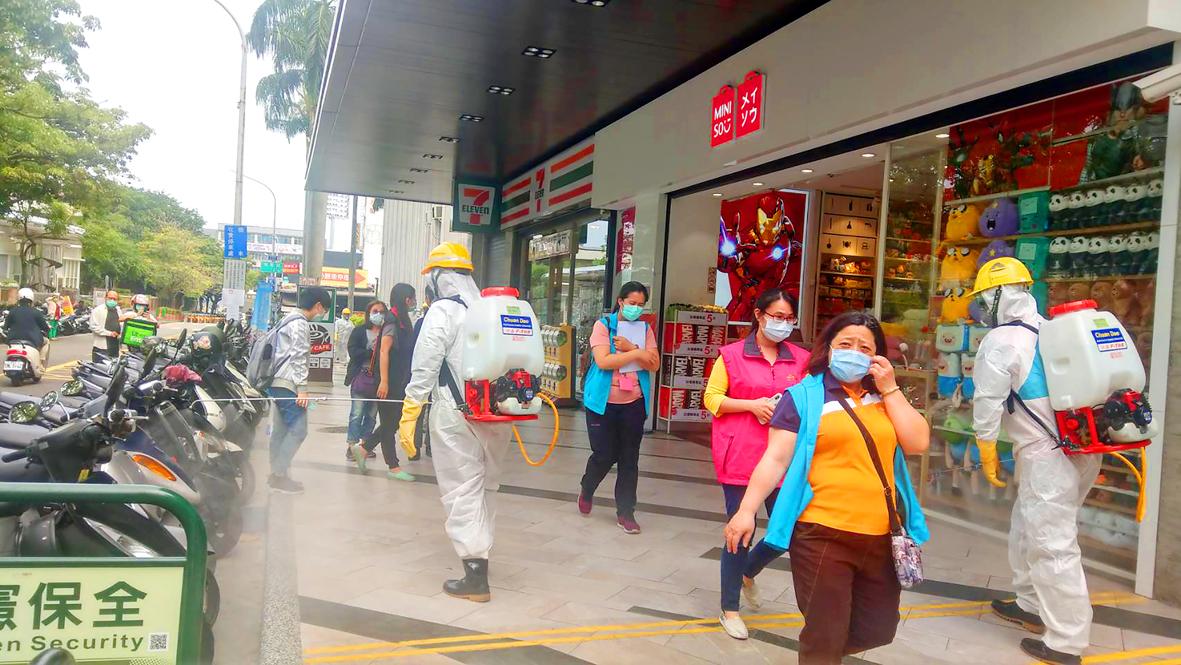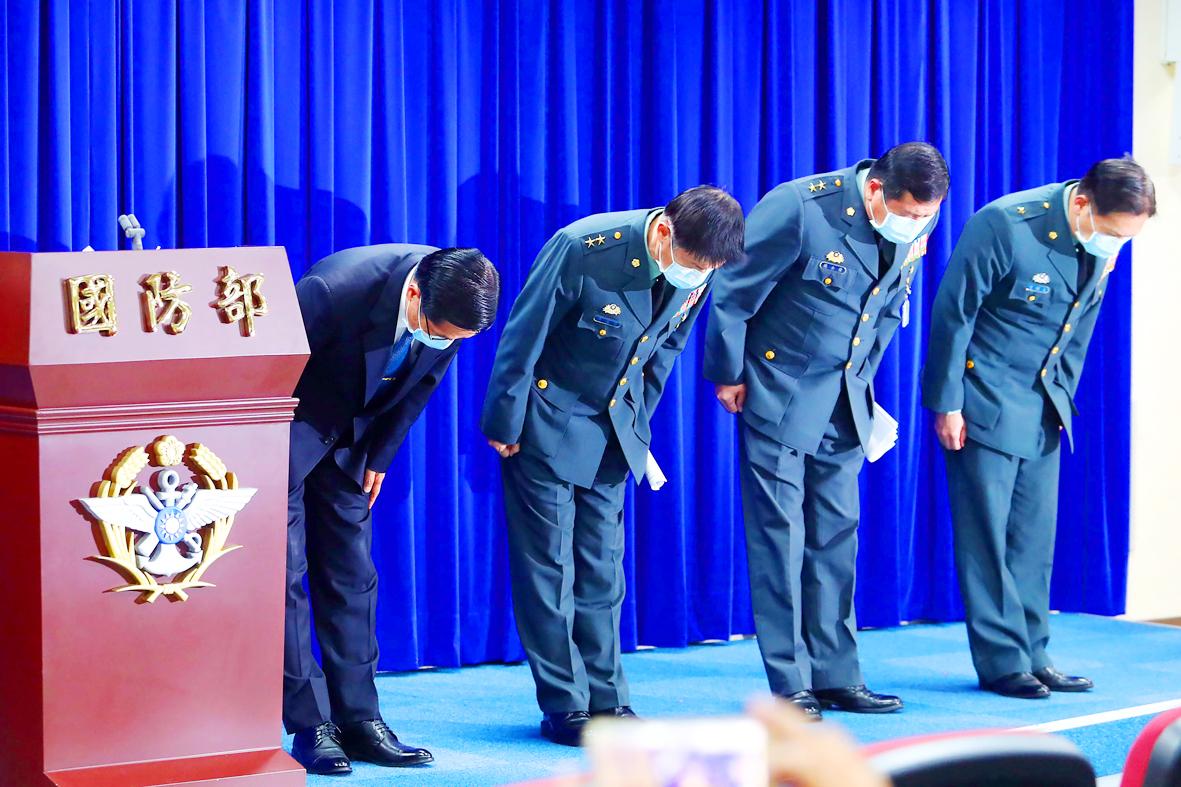The Central Epidemic Command Center (CECC) yesterday reported three new COVID-19 cases, all of whom were crew aboard the navy supply ship Panshih (磐石), adding that it is still investigating the source of infection.
The Panshih was one of the three vessels making up a “Friendship Flotilla” that visited Palau from March 12 to 15 before returning to Kaohsiung’s Zuoying Naval Base on April 9. The crew disembarked on Wednesday last week.
The center on Saturday first reported that three men in their 20s who had interned on the Panshih had the virus.

Photo courtesy of the Taichung City Government via CNA
All 744 officers, sailors and cadets on board the three vessels were recalled on Saturday for testing and ordered into quarantine facilities for 14 days.
The center on Monday unveiled an online map that shows more than 90 locations visited by infected naval personnel, which can be accessed at: bit.ly/2zdT9hH.
The number of those infected in the cluster had increased to 27 as of yesterday.

Photo: CNA
The center is still probing the infection path of the cluster, Minister of Health and Welfare Chen Shih-chung (陳時中), who heads the center, told a daily news briefing yesterday.
Asked to comment on the Palauan Ministry of Health’s statement a day earlier that said there is little chance that the outbreak on the vessel came from Palau, Chen said that using fragmented information to infer the origin of infection is risky.
The three new cases reported yesterday — two men and a woman in their 20s and 30s — tested negative for the virus at first, but tested positive after a second test, he said.
Health authorities have identified 349 people who had contact with the 27 confirmed cases, including 187 who were placed under home isolation and 162 who have been told to conduct self-health management, the center said.
Later, at 8:30pm yesterday, the Ministry of National Defense called an impromptu press conference, during which Minister of National Defense Yen De-fa (嚴德發) bowed and apologized to the public for the cluster of infections.
Yen said he had asked President Tsai Ing-wen (蔡英文) to punish him.
Navy Commander Admiral Liu Chih-pin (劉志斌) had also asked to be punished, he said, adding that he has transferred Rear Admiral Chen Tao-hui (陳道輝) and Vice Admiral Kao Chia-pin (高嘉濱) — the captain and commander respectively of the Friendship Flotilla — to different posts.
Other personnel responsible for the incident would receive due punishment as investigation progresses, Yen added.
Yen said he gave the green light for the flotilla to set sail, adding that during a routine meeting he had briefed Tsai about the decision.
The president respected his decision, he said.
While disease prevention plans had been discussed and prepared prior to the voyage, there were four flaws, Yen said.
First, the captain on the vessel did not follow reporting requirements, and failed to tell their superiors about the medical condition of the personnel onboard, he said.
Second, the division responsible for diagnostic tests did not carry out their job thoroughly and did not identify abnormalities, he said.
Third, military personnel did not manage their health sufficiently during the mission, as some of them did not always wear a mask, he said.
Fourth, there was room for disease prevention regulations and standard procedures to be more carefully devised prior to the trip.
In response to media queries on what the special mission was about, after Democratic Progressive Party Legislator Wang Ting-yu (王定宇) on Monday said the flotilla was involved in a “special mission,” Yen said that when the flotilla was sailing back to Taiwan, several Chinese military vessels were circulating the nation.
The vessels were sailing through the Bashi Channel on April 12, so the ministry decided to take advantage of the flotilla’s geological location and assigned it to monitor the Chinese vessles’ movement, Yen said, adding that “it was a great training opportunity for the navy.”
Separately yesterday, the Ministry of Foreign Affairs said that 24 Taiwanese and their families at the nation’s embassy and technical mission in Palau have been screened as a precaution as they had come in contact with those aboard the naval fleet last month.
The results are to be released today.

Taiwan is gearing up to celebrate the New Year at events across the country, headlined by the annual countdown and Taipei 101 fireworks display at midnight. Many of the events are to be livesteamed online. See below for lineups and links: Taipei Taipei’s New Year’s Party 2026 is to begin at 7pm and run until 1am, with the theme “Sailing to the Future.” South Korean girl group KARA is headlining the concert at Taipei City Hall Plaza, with additional performances by Amber An (安心亞), Nick Chou (周湯豪), hip-hop trio Nine One One (玖壹壹), Bii (畢書盡), girl group Genblue (幻藍小熊) and more. The festivities are to

Auckland rang in 2026 with a downtown fireworks display launched from New Zealand’s tallest structure, Sky Tower, making it the first major city to greet the new year at a celebration dampened by rain, while crowds in Taipei braved the elements to watch Taipei 101’s display. South Pacific countries are the first to bid farewell to 2025. Clocks struck midnight in Auckland, with a population of 1.7 million, 18 hours before the famous ball was to drop in New York’s Times Square. The five-minute display involved 3,500 fireworks launched from the 240m Sky Tower. Smaller community events were canceled across New Zealand’s

‘IRRESPONSIBLE’: Beijing’s constant disruption of the ‘status quo’ in the Taiwan Strait has damaged peace, stability and security in the Indo-Pacific region, MOFA said The Presidential Office yesterday condemned China’s launch of another military drill around Taiwan, saying such actions are a “unilateral provocation” that destabilizes regional peace and stability. China should immediately stop the irresponsible and provocative actions, Presidential Office spokeswoman Karen Kuo (郭雅慧) said, after the Chinese People’s Liberation Army (PLA) yesterday announced the start of a new round of joint exercises around Taiwan by the army, navy and air force, which it said were approaching “from different directions.” Code-named “Justice Mission 2025,” the exercises would be conducted in the Taiwan Strait and in areas north, southwest, southeast and east of Taiwan

UNDER WAY: The contract for advanced sensor systems would be fulfilled in Florida, and is expected to be completed by June 2031, the Pentagon said Lockheed Martin has been given a contract involving foreign military sales to Taiwan to meet what Washington calls “an urgent operational need” of Taiwan’s air force, the Pentagon said on Wednesday. The contract has a ceiling value of US$328.5 million, with US$157.3 million in foreign military sales funds obligated at the time of award, the Pentagon said in a statement. “This contract provides for the procurement and delivery of 55 Infrared Search and Track Legion Enhanced Sensor Pods, processors, pod containers and processor containers required to meet the urgent operational need of the Taiwan air force,” it said. The contract’s work would be